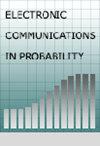边界情况下二元分支布朗运动负半线上的出生总数
IF 0.5
4区 数学
Q4 STATISTICS & PROBABILITY
引用次数: 0
摘要
边界情况下的二元分支布朗运动是实线上的粒子系统,其行为如下。它从时间0时位于原点的唯一粒子开始。粒子根据漂移µ=2和扩散系数σ2=2的布朗运动移动,直到参数1的独立指数时间。那时,粒子死亡,生下两个孩子,然后从出生地开始独立复制相同的过程。众所周知,在这个系统中,粒子云最终会漂移到∞。本注释的目的是对负半线上产生的粒子总数进行精确估计,特别是研究这个随机变量的尾部衰变。本文章由计算机程序翻译,如有差异,请以英文原文为准。
Total number of births on the negative half-line of the binary branching Brownian motion in the boundary case
The binary branching Brownian motion in the boundary case is a particle system on the real line behaving as follows. It starts with a unique particle positioned at the origin at time 0 . The particle moves according to a Brownian motion with drift µ = 2 and diffusion coefficient σ 2 = 2 , until an independent exponential time of parameter 1 . At that time, the particle dies giving birth to two children who then start independent copies of the same process from their birth place. It is well-known that in this system, the cloud of particles eventually drifts to ∞ . The aim of this note is to provide a precise estimate for the total number of particles that were born on the negative half-line, investigating in particular the tail decay of this random variable.
求助全文
通过发布文献求助,成功后即可免费获取论文全文。
去求助
来源期刊

Electronic Communications in Probability
工程技术-统计学与概率论
CiteScore
1.00
自引率
0.00%
发文量
38
审稿时长
6-12 weeks
期刊介绍:
The Electronic Communications in Probability (ECP) publishes short research articles in probability theory. Its sister journal, the Electronic Journal of Probability (EJP), publishes full-length articles in probability theory. Short papers, those less than 12 pages, should be submitted to ECP first. EJP and ECP share the same editorial board, but with different Editors in Chief.
 求助内容:
求助内容: 应助结果提醒方式:
应助结果提醒方式:


